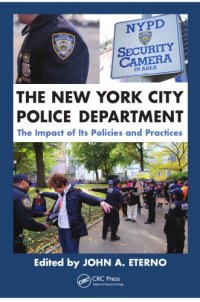''Studying the flagship New York City Police Department is critical to understanding policing and democratic society. An examination of the department by experts who have been watching it for years, this book reviews qualitative research on how the community views the NYPD, police culture, resistance to change, and the drop in the homicide rate in recent years. It explores hiring, firing and retention, discusses
crime-fighting strategies, and reviews legal concerns and the response to public demonstrations such as the Occupy Wall Street movement. The final chapter demonstrates how the lessons relate to other departments throughout the world''--''1 Introduction John A. Eterno Evidence-based policing is a term used for developing and improving policy based on scientific study: what works. It is forward thinking. It is not a rubber stamp for existing programs. A study based on sound scientific methods is conducted and then policy is developed, tested, or reformed based on the results. This requires an open-minded, transparent department willing to allow data to be given to an outside, independent research team. Good examples of this include: Taylor et al.'s study of sex crime victims in Victoria, Australia (see Taylor et al., 2012) or Engel's various works with the police of Cincinnati, United States (see, e.g., Thompson, 2009 or Engel & Whalen, 2010). Conversely, the New York City Police Department engages in what has been described as policy-based evidence making. It is a pejorative term meaning they work back from a policy that has been in place for years and try to find evidence for it. One strategy is to invite those likely to be friendly to them from outside (e.g., Smith & Purtell, 2006; RAND Corporation, 2009) who work closely with the department, sometimes in a give-and- take manner, in a likeminded pursuit, ultimately to justify at least some of the necessary evidence to defend the status quo. Indeed, such researchers can be hired by friends of the police department or even the police department itself (no independent funding sources such as federal or private grants or other government sources) making independent findings unlikely (e.g., see the Statement by the New York City Bar Association (2009) exposing numerous concerns with the RAND report and Floyd v. City of New York case excerpts on the Center for Constitutional Rights website specifically showing how the police''--
Read more... 